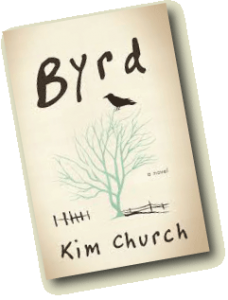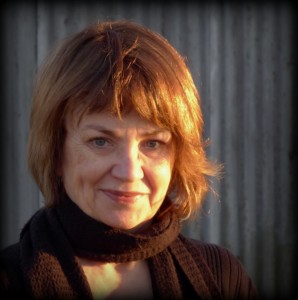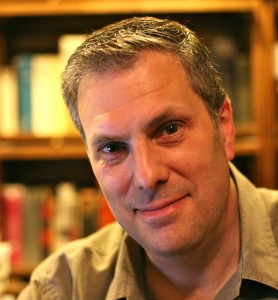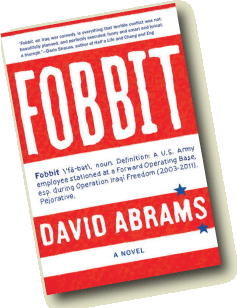 I've loved getting to know Kim Church, whose debut novel, Byrd, came out earlier this year from Dzanc Books. I've admired Dzanc for years and have enjoyed every book I've read from them, so I wasn't surprised to discover that Byrd is a beautifully written, honest story that follows the arc of a woman's life from the time she meets the cool guy in high school who winds up fathering her child, to when she's an older woman, looking back on her decision to put that child up for adoption. I was most struck by the subtle way Kim gets inside her characters' heads, especially her protagonist, Addie. I was eager to ask her some questions about how she wrote Byrd:
VP: I’m so happy for you that Byrd has received such fine recognition. I wonder if you can share with us your path to writing this wonderful first novel and to its publication?
I've loved getting to know Kim Church, whose debut novel, Byrd, came out earlier this year from Dzanc Books. I've admired Dzanc for years and have enjoyed every book I've read from them, so I wasn't surprised to discover that Byrd is a beautifully written, honest story that follows the arc of a woman's life from the time she meets the cool guy in high school who winds up fathering her child, to when she's an older woman, looking back on her decision to put that child up for adoption. I was most struck by the subtle way Kim gets inside her characters' heads, especially her protagonist, Addie. I was eager to ask her some questions about how she wrote Byrd:
VP: I’m so happy for you that Byrd has received such fine recognition. I wonder if you can share with us your path to writing this wonderful first novel and to its publication?
KC: Thanks, Ginny. Years ago a friend told me about a woman—an independent, single, capable woman—who had an unplanned pregnancy in her thirties and decided to give up her baby for adoption. I was fascinated. How had she made the decision; how did she live with it? I didn’t press my friend for details, but I couldn’t stop wondering: how would it feel, being mother to a child who would forever be absent from you, by your own choice? I’d never come across such a character in literature. So I wrote one.
It took me ten years, off and on, to write Addie’s story—five to write the first manuscript, five more after I realized I had to start over. It took several more years to find and agent and a publisher. Not a short project, this book. But writing it taught me how to write a novel. And I ended up with the right agent, and she found the right press.
VP: Byrd is set in North Carolina, where you live. I wonder if some elements of it are autobiographical, or if that was a concern of yours—to both write what you know while also creating afresh?
KC: I borrowed details from places I’ve lived or spent time, but I took extreme liberties. I invented and changed and rearranged details to suit the story. (Sort of like when my husband and I were in New York staying in a nondescript building in a neighborhood we weren’t familiar with. A movie was being filmed nearby, and on our first day, while we were out, the filmmaker changed all the street signs.)
One thing I love about writing fiction is how it teaches you to see even the most familiar places through fresh eyes. To pay attention to things you ordinarily take for granted.
VP: Your novel is written in short sections interspersed with letters and asides. I wonder if you can talk about the structure you chose to tell this story. It seems to fit your characters perfectly and I wonder if you were trying to capture something about memory and loss.
 KC: The structure evolved from the story. My first draft was a linear first-person narrative from Addie’s point of view. When I began to revise, I realized first-person didn’t work: Addie
doesn’t know enough to tell the whole story. So I—gulp—started over, writing from every point of view I could think of. At the same time, I didn’t want to lose the intimacy of first person; I wanted to keep Addie’s voice—which I did through her letters to Byrd, her absent son. The book ended up with a fairly intricate structure, but it worked, at least for me. It gave me access to the whole story. And, as you say, it also led me to think more about missed connections and missed opportunities and the slipperiness of memory and just how little people actually know about each other.
KC: The structure evolved from the story. My first draft was a linear first-person narrative from Addie’s point of view. When I began to revise, I realized first-person didn’t work: Addie
doesn’t know enough to tell the whole story. So I—gulp—started over, writing from every point of view I could think of. At the same time, I didn’t want to lose the intimacy of first person; I wanted to keep Addie’s voice—which I did through her letters to Byrd, her absent son. The book ended up with a fairly intricate structure, but it worked, at least for me. It gave me access to the whole story. And, as you say, it also led me to think more about missed connections and missed opportunities and the slipperiness of memory and just how little people actually know about each other.
VP: In the months since Byrd came out, I’m sure you’ve been busy with social media and events, but I’m curious what you’re working on next?
KC: I’ve started a second novel set during the Gastonia textile strike of 1929, a defining and shameful episode in North Carolina labor history that never gets talked about. I grew up in this state; my paternal grandparents worked in cotton mills all their lives; yet I knew nothing of the Gastonia strike or the much larger general strike of 1934 until long after their deaths.
VP: Any last thoughts for aspiring writers? This is your chance to offer a pep talk or any unexpected tips.
KC: What I’d say to aspiring writers: read, write. Write and write and write until you know who you are as a writer, until you recognize what’s unique and authentic about your voice, until you’ve figured out how you work. Then trust yourself. Have a reader or two you can trust, too, because you can’t be right all the time.
The other thing I’d say is, things usually work out. Maybe not exactly when or how you’ve imagined, but if you keep at it, if you can figure out what’s yours to write and write it as well as you can and keep yourself open to possibility, something good will come.



